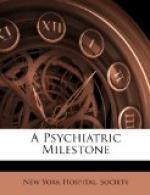This question of stimuli deserves further notice. It is not so difficult to realize the mechanism by which a stimulus which clearly crosses the threshold of consciousness can lead to a given reaction. But it is perhaps difficult to imagine how so many stimuli which do not cross the threshold of consciousness or which, if they do, are not recognized by the patient at the time as having any reference whatever to the special memory can yet set the memory mechanism into action. The result may not be seen till after the relapse of some considerable period of time, as in the case of a man who for years had been disturbed by terrific nightmares, based on the idea of snakes coming out of the ground and attacking him. He complained one day that he was much worse, that three nights before he had had the worst nightmare of his life. On being questioned as to what could have suggested snakes to him he could not tell. A few minutes later he said: “I think I know the cause now. I spent the evening before I had that nightmare with a sergeant who had returned from the service in India.” This friend amongst other things had mentioned that whenever they were about to bivouac they had to search every hole under a stone and every tuft of grass to see that there were no snakes there. This, which had been received as an ordinary item of information, had been the stimulus which had set his memory mechanism into action and the nightmare between two and three o’clock in the morning had been the result.
The result in many instances is evidenced by an emotional state alone and the actual memory of the original experience may not come into consciousness. Many examples of this might be given. The sound of a trolley wheel on a tram wire in one case gave rise to terror instead of its normal reaction, viz., that of satisfaction at getting to the destination quickly and without effort. This terror was produced because the sound on the wire resembled that of a shell which came over, blew in a dugout, killed three men, and buried the patient. No memory of this incident came into consciousness, only a terror similar to that experienced at the time of the original incident was experienced. Or, the time four o’clock in the afternoon could act as a stimulus to arouse an emotional state of misery similar to that experienced at the same time of day during an illness some years previously. Or, passing the house of a doctor when on a bus could produce a sudden outburst of anxiety, giddiness, and confusion; the patient had been taken into that house at the time of an epileptic attack. Or, showing photographs of the front could lead to an epileptic attack which was based on the memory of the time when the patient was wounded in the head; this has occurred on two separate occasions separated by an interval of some months. Or, noticing a familiar critical tone in a remark made at a dinner-table could lead to an acute change of feeling so that the subject who, before dinner, had felt she would like to play a new composition on the piano so as to obtain the opinion of the guest who had exhibited the critical tone, after dinner felt incapable of doing so. Her feelings had been hurt on many former occasions by critical remarks made by him in that tone. The critical remarks were not called to memory but there arose the feeling that under no circumstances could she play that piece to him.




